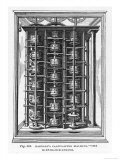|
• GRACE HOPPER EDUCATIONAL POSTERS
Science & Technology Posters
|
|
|
Grace Hopper, Computer Scientist
|
|
|
|
|
|
Historic Women of Mathematics Poster -
Hypatia of Alexandria
Sofia Kovalevskaya
Sophie Germain
Emmy Noeker
Grace Hopper
|
|
|
|
|
|
The Computer
Inventions that Changed
the World -
Most people think of the computer as a fairly recent invention. But the first "computers" were actually built hundreds of years ago!
Many experts say the very first computing device ever made was the abacus, which was in use more than 2,000 years ago. In 1642, the mathematician Blaise Pascal invented a device that used gears and dials to solve complex addition problems. But the true “father“ of the modern computer was a brilliant math teacher from England named Charles Babbage. Babbage, who is shown here, designed a machine in 1833 that was more than a century ahead of its time. He called his machine a "difference engine," and it performed long mathematical calculations. Then he thought up and designed a machine that would perform even harder calculations. He called it an “analytical engine.” It stored information in a "memory" and was operated by means of cards with holes punched in them. But it was so complicated that the best engineers of the time could not build it.
The next great advance in computers was the construction of ENIAC –the Electrical Numerical Intergrator and Calculator – in 1946. ENIAC was the first general-purpose electronic digital computer. Altogether, it was 100 feet long and teen feet tall, and it weighted 30 tons. In the 1970s, the introduction of the microchip helped reduce the size of computers. Thanks to microchips, today's desktop computers can do much more than the room-sized ENIAC, and they can do thing many times faster.
Today, it is hard to imagine a world without computers. Computers are used in many simple, everyday routines, from making a telephone call, to going thorough supermarket checkout line, to putting money in a bank account. And more complicated activities, such as operating weapons systems, controlling air traffic, and monitoring surgical procedures, are also dependent on computers. Computer networking allows for nearly instantaneous worldwide communications and access to information. And computers have speeded up innovations in nearly every field.
• more Inventions that Changed the World posters
|
|
|
|
|
• Famous Women posters
• Computer posters
• Math posters
• more science posters
|
|
|
“When you have a good idea and you've tried it and know it's going to work, go ahead and do it - because it is much easier to apologize later than to get permission.”
“In pioneer days they used oxen for heavy pulling, and when one ox couldn't budge a log, they didn't try to grow a larger ox. We shouldn't be trying for bigger computers, but for more systems of computers.”
Rear Admiral Grace Murray Hopper
Read more about Grace Hopper.
Grace Hopper: The First Woman to Program the First Computer in the United States - library binding, ages 9-12
Grace Murray Hopper: Working to Create the Future - reading level 4-7.
Grace Hopper: Computer Pioneer -library binding, ages 9-12
Understanding Computers by Grace Murray Hopper
COBOL for the 21st Century- COBOL is still thriving. In fact, it's practically a perennial. New version of COBOL for PCs now enable you to use COBOL to develop interesting graphical user interfaces, create Web pages, and even incorporate components from other languages such as Visual Basic.
Girls Think of Everything: Stories of Ingenious Inventions by Women
by Catherine Thimmesh, Melissa Sweet- In kitchens and living rooms, in garages and labs and basements, even in converted chicken coops, women and girls have invented ingenious innovations that have made our lives simpler and better. Their creations are some of the most enduring (the windshield wiper) and best loved (the chocolate chip cookie). What inspired these women, and just how did they turn their ideas into realities?
LINKS FOR LEARNING: GRACE HOPPER
The Life of Grace Hopper
The Wit and Wisdom of Grace Hopper
Grace Hopper: Mother of the Computer
National Women's Hall of Fame
Grace Hopper Celebration- Women Computing
Navy Commissions the USS Hopper
Smithsonian- Exploring the History of Women Inventors
|







